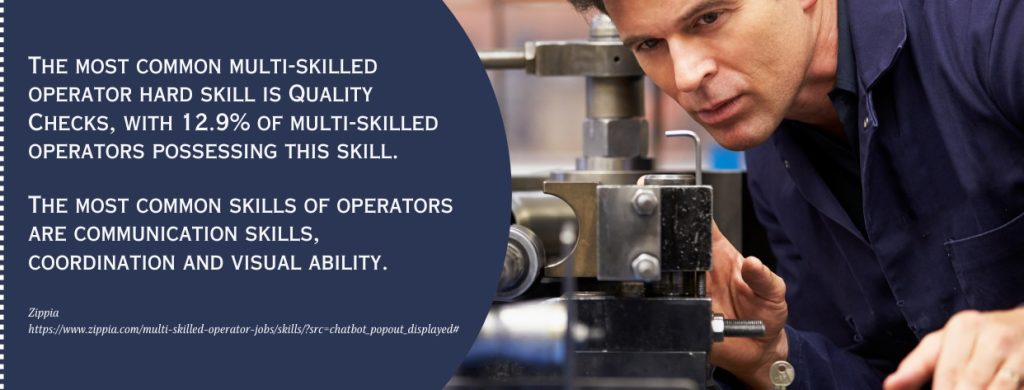There are various trade careers available these days, and choosing the right one for you can be daunting. However, you might want to become an Operator as a trade job if you have mechanical aptitude, hand-eye coordination, problem-solving skills, technical knowledge, patience and diligence, among other personal qualities.
Even if you know little about the industry, enrolling in trade schools and engaging in Operator training programs will provide you with the set of skills and knowledge necessary to fill entry-level positions and climb the ranks to success.
What is an Operator as a Trade Career?
In the context of trade careers and vocational careers, an Operator is a skilled worker who specializes in operating specific types of machinery, equipment, or systems related to a particular trade or industry, such as construction, manufacturing, or transportation.
The roles and responsibilities of Operators include the following:
- Start, control, and operate machinery and equipment as needed for specific tasks and projects.
- Continuously monitor the equipment’s performance and make adjustments as necessary to maintain efficiency and safety.
- Conduct routine inspections to identify and address any maintenance or safety issues to prevent accidents and breakdowns.
- Ensure that safety protocols are followed, and measures to minimize risks associated with the equipment are taken.
- Troubleshoot and diagnose problems when issues arise, perform minor repairs and adjustments, or coordinate with maintenance teams for more extensive repairs.
Methodology
If you’re looking for online trade schools offering Operator training programs, you won’t have to search further! We generated a list of the universities, colleges, and learning institutions offering the best Operator programs in fully online or hybrid learning formats.
We have carefully handpicked each of the institutions on our list based on certain criteria, including the following:
- Delivers a comprehensive curriculum that covers the core elements of the trade to provide students with a solid foundation, especially for entry-level positions in the industry. Coursework includes hands-on training, safety protocols, and industry-specific knowledge,
- Includes courses that foster strong leadership qualities and effective decision-making, among other skills necessary for success in trade professions,
- Have seasoned instructors who possess real-world experience and academic expertise in the field,
- Emphasizes the application of theoretical knowledge through practical training, simulations, and internships, among other experiential learning activities,
- Provides opportunities to network with professionals and organizations in their chosen trade to open doors for career advancement and job placement,
- Holds institutional and programmatic accreditation from organizations recognized by the U.S. Department of Education and industry associations.
5 Top Online Skilled Operator Trade Schools
Butler Community College

- Location: Andover, Kansas
- Online Delivery Method: Online, Self-paced
- Time It Takes to Complete: 12 months
- Completion Rate: undisclosed
- Types of Aid: Financing Installment Plan, Military Tuition Assistance, Government Funding
Butler Community College offers a Chemical Plant Operations online training program for students who want to gain entry-level positions as chemical plant operators. There are thousands of chemical plants across the country with an ongoing need for novice technical workers.
This trade program requires students to complete 400 hours of self-paced coursework in 12 months. It’s designed for students with minimal knowledge of chemistry, math and physics as well as of the industry, as the required science studies are incorporated into the curriculum.
In addition to the technical and industrial know-how required for entry-level chemical plant operators, students are also taught the industry safety practices, regulations and standards required for the role.
Courses under this program include the following:
- Basic Hazard Communication
- Basic Lockout-Tagout
- Basic Process Instrumentation and Control
- Basic Safety
- Chemistry Fundamentals
- Pump Fundamentals
- Centrifugal Pumps: Operation
- Electrical Safety
- Electricity for Operators and Technicians
- Heat Exchangers
- How to Read Process Drawings
- Industrial Valves
- Lubrication and Bearings
The program is open enrollment, which means students can start at any time. Upon completion, students get a Certificate of Completion. Take note, though, that this program doesn’t prepare students for certification.
Butler Community College holds an accreditation recognized by the Kansas State Board of Regents and the Higher Learning Commission.
Sacramento State – College of Continuing Education

- Location: Sacramento, California
- Online Delivery Method: Online, Self-paced
- Time It Takes to Complete: 90 hours
- Completion Rate: undisclosed
- Types of Aid: Federal and State Grants, Federal Loans, Alternative/Private Loans, Federal/State Training Funds, Scholarship Funds, Corporate Reimbursement
College of Continuing Education (CCE) at California State University, Sacramento, offers an online Wastewater Treatment Plant Operation Specialist Certificate Program that trains students to become skilled operators who will ensure the protection and enhancement of water resources as well as public health and the environment.
This Operator technical training program requires students to complete 18 units of academic credit to obtain the Certificate of Academic Achievement. The curriculum essentially covers three 90-hour courses that are to be taken sequentially. These courses are:
- Operation of Wastewater Treatment Plants I
- Operation of Wastewater Treatment Plants II
- Advanced Waste Treatment
Those who are seeking to earn continuing education credits to take a state certification exam as operators can also enroll in this program or opt to take specific courses individually, depending on their requirements.
The program is offered continuously, and students can begin their courses at any time.
The Western Association of Schools and Colleges has fully accredited California State University, Sacramento.
University of South Florida

- Location: Tampa, Florida
- Online Delivery Method: Online, Live
- Costs: varies
- Time It Takes to Complete: undisclosed
- Completion Rate: undisclosed
- Types of Aid: Work Study, Loans, Grants, Scholarships
The International Facility Operator Certification offered by the University of South Florida is a training program in live online learning format designed to provide students with the essential skills and knowledge to work on, troubleshoot and maintain high-pressure steam equipment utilized in modern power plants and other industrial applications.
This vocational training program covers the essential topics for facility operators, including preparatory math, communication skills, operational and industrial safety, boiler designs and systems, heat engines, HVAC basics, and foundational concepts in thermodynamics, mechanics and dynamics, and fluid handling.
Students who complete this training program will be awarded a Fourth Class Power Engineer certification by the NIULPE or National Institute for the Uniform Licensing of Power Engineers, a certification recognized in various regions as well as internationally. The program also provides continuing education contact hours or CEUs to those who need them.
The University of South Florida has met Southern Association of Colleges & Schools Commission on Colleges standards to award degrees at various levels.
University of Houston

- Location: Houston, Texas
- Online Delivery Method: Online, Self-paced
- Time It Takes to Complete: 12 months
- Completion Rate: undisclosed
- Types of Aid: Installment Payment Plan, Government Funding, Military Tuition Assistance
The University of Houston offers a Certificate in Power Plant Operations online trade career training program that provides students with a set of knowledge and skills to fulfill entry-level roles in the power generation industry.
Aside from covering the essential topics and technicalities in power plant and production equipment operations, the curriculum also emphasizes to students the importance of basic safety protocols and the industry’s best practices.
The training program is also designed for students with minimal knowledge of the industry as well as of chemistry, math and physics. More specifically, the curriculum incorporates the sciences relevant and applicable to novice power plant operators.
Here are some of the courses available under this program:
- Basic Safety
- Basic Hazard Communication
- Basic Lockout-Tagout
- Basic Math 1 to 3
- Applied Physics 1 to 3
- Electricity for Operators and Technicians
- How to Read Process Drawings
- Basic Process Instrumentation and Control
- Centrifugal Pumps: Operation
- Boiler and Auxiliaries 1 to 3
Students are given a Certificate of Completion after finishing the training program. It should be noted, however, that this program doesn’t prepare students for any certification exams.
The SACSCOC has approved the University of Houston to award degrees.
Community College of Denver

- Location: Denver, Colorado
- Online Delivery Method: Hybrid
- Time It Takes to Complete: 3 semesters
- Completion Rate: undisclosed
- Types of Aid: FAFSA, Scholarships
The CNC Machine Tool Operator Certificate Program is one of the Machine Technologies programs offered by the Community College of Denver that combines classroom learning and practical experiences in both face-to-face and online formats. In this training program, students will have first-hand experiences working with computer numeric control (CNC) machines, manual lathes, and milling machines.
The Operator training program requires students to complete a total of 41 credits to obtain the Certificate credential. These credits can also apply toward the school’s Associate of Applied Science in Machining Technologies with a CNC machining technologies manufacturing emphasis.
Some of the courses under the Certificate training program are the following:
- Machine Shop Safety
- Introduction to Machine Shop
- Introduction to CNC Operations
- Introduction to PC Applications
- Introduction to CNC Turning Operations
- Introduction to CNC Milling Operations
- Print Reading for Machinists
- Advanced Inspection Techniques
- Design for Manufacturability
The Higher Learning Commission has approved the institutional accreditation of the Community College of Denver.
Examples of Operators as Trade Careers
Take note, though, that for this article, we do not include Heavy Equipment or Heavy Machine Operators, as they will be discussed on a separate page.
Power Plant Operators
Power Plant Operators control electric power-generating systems. The median annual pay for Power Plant Operators, Distributors, and Dispatchers is $97,570, according to the latest data from the Labor Statistics Bureau.
Even if employment for Power Plant Operators is expected to decline in the next decade, the industry will still require an average of 3,200 each year to replace those who’ll be retiring or changing occupations.
Boiler Operators are skilled professionals who ensure that boilers operate efficiently and safely while providing steam or hot water for heating, power generation and industrial processes. BLS reveals that the median annual wage of boiler operators, along with stationary engineers, was at $67,120 as of May 2022.
According to BLS, employment growth for these occupations is stable, growing as fast as the average for all jobs. Around 3,600 job openings are expected every year over the next ten years.
Water and Wastewater Treatment Plant Operators
These operators manage the systems that transfer and treat water and wastewater. Their median annual wage as of May 2022 was $51,600. A decline in employment growth is expected over the next decade, but the industry will still open around 10,500 positions every year to replace the existing workers who’ll be changing careers or will retire.
Chemical Plant Operators
Chemical Plant Operators control the machines that handle chemical processes. They also ensure the safe and efficient production of various chemical products. The median pay for these jobs as of May 2022 was $82,670 per year.
CNC Tool Operators
Computer Numerically Controlled (CNC) Tool Operators use computer-controlled machines to shape or process materials like metal, plastic, wood and stone. They also handle equipment setup and maintenance. The median annual wage as of May 2022 was $46,760.

Frequently Asked Questions about Online Operator Trade Schools
What types of equipment or machinery will I learn to operate in Operator Trade School programs?
The specific equipment and machinery you’ll learn to operate can vary depending on the program’s focus. Common examples include CNC machines, printing presses and many others. Some programs may specialize in a particular type of equipment, while others provide a broader education covering various machinery units relevant to the trade industry.
It’s essential to review the curriculum of the program you’re interested in to ensure it aligns with your career goals and interests.
Can I complete Operator Trade School programs entirely online, or do they usually require in-person attendance?
The format of Operator Trade School programs varies. Some programs are entirely online, which allows you to complete your coursework remotely. However, many programs, especially those with hands-on components, follow a hybrid model where online learning is combined with occasional in-person sessions, labs, or workshops to provide practical training.
The availability of fully online programs depends on the trade and the specific school, so it’s essential to research and select a program that suits your preferences and needs.
Are financial aid options available for online/hybrid Operator Trade School programs?
Yes, financial aid options are often available for those training programs. If the program offers Certificate credentials, you can explore federal financial aid programs, such as the Free Application for Federal Student Aid. Additionally, many schools offer grants, loans, scholarships, and tuition assistance programs specifically for trade students.
Students are advised to research financial aid opportunities, including scholarships and grants from professional organizations and trade associations related to their field of interest. You can also reach out to the school’s financial aid office for guidance on securing financial assistance for your education.
For more valuable information, see the following:

